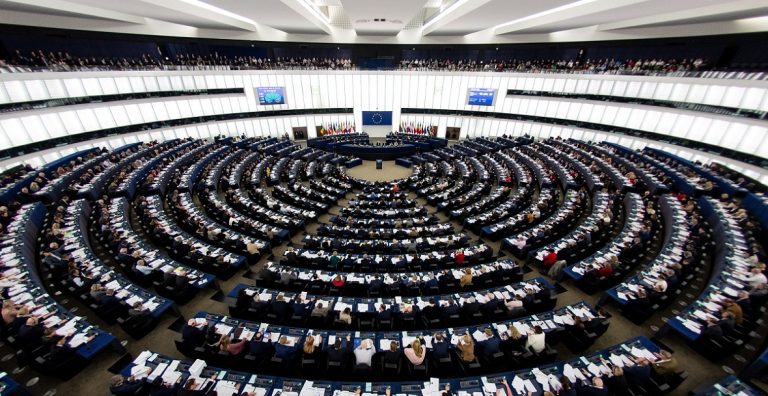20 de diciembre 2019

Children of Exile: The Births “Sowing Hope” in the Camp of Nicaraguan Farmers

PUBLICIDAD 1M
PUBLICIDAD 4D
PUBLICIDAD 5D
With 560 votes in favor, the European Parliament agreed to send a delegation to Nicaragua and urged Ortega to allow them to enter the country

With 560 votes in favor
The European Parliament demanded on December 19th that Daniel Ortega’s regime put an end to the repression, resume political dialogue, dismantle the paramilitary, and free all the political prisoners.
The EU proposed sending a delegation to Nicaragua that – among other topics – would evaluate the future of the Trade Association Agreement, with an eye to considering the possible suspension of Nicaragua. These were the contents of a resolution against the regime approved Thursday, with 560 votes in favor, 12 opposed and 63 abstentions.
The European deputies feel that the democratic clause in the Trade Association Agreement between the European Union and Central America should be activated, suspending Nicaragua from the accord due to the fact that the Ortega regime has disrespected the principles of rule of law, democracy and human rights.
The Parliament urged Ortega to allow the delegation unrestricted entry into the country and access to all parties and all areas. Months previous, Ortega blocked entry into the country to a delegation from a high level work group of the Organization of American States (OAS) that proposed to analyze the situation in Nicaragua and its compliance with the requirements and proceedings of the Inter-American Democratic Charter.
The European deputies debate on Nicaragua
The name of political prisoner Eva Amaya Coppens and an insistent call for the application of sanctions against figures of the regime of Daniel Ortega and Rosario Murillo resonated in the European Parliament this past Wednesday, Dec. 18.
Several European deputies took on the issue of the Nicaraguan socio-political crisis and voted overwhelmingly to condemn the repression that the Nicaraguan citizens suffer. At the same time, they called for the expulsion of the regime from the Trade Association Agreement that the European bloc maintains with Central America.
The European deputies were energetic in their two-minute interventions: they criticized the “irrational” human right violations the regime has committed and demanded that the parliament exercise more forcefulness in implementing concrete actions in opposition to the Ortega-Murillo Administration.
The idea of the deputies is to force the government to free the more than 160 political prisoners and resume the dialogue in search of a negotiated solution to the crisis that began in April 2018.
The MEPs who proposed that Nicaragua be expelled from the Trade Association Agreement, and also suggested drawing up a list of functionaries and government entities that have violated human rights and should be sanctioned. Not only that, they urged the “review, for correcting or sanctioning” of European companies that have collaborated with the Ortega regime. In the words of the European deputy Tilly Metz, to examine if there was “complicity” in the human rights violations.
“Hundreds of people have been imprisoned for protesting against the government. [The Nicaraguan-Belgian medical student] Amaya Coppens was returned to jail. We ask the government to immediately cease oppressing its own population, that they free the political prisoners and hold credible elections,” argued Metz.
She later advised: “Our diplomats in Nicaragua should work towards reconciliation and should review the responsibilities of European companies or corporations and the role they‘ve played in offering support to this government. We need the actions of the European companies to be transparent; measures should be taken in cases of complicity with human rights violations.”
In the plenary session there was great awareness of the recapture of Amaya Coppens after she [along with 12 other young people] brought water to the family members who were on a hunger strike in the San Miguel Church in Masaya.
In addition, the European deputies criticized the persecution suffered by human rights advocates, the aggressions suffered by journalists, and the harassment of the Catholic Church, including of individual priests and the profaning of churches.
Urged to approve sanctions
Josep Borrell, the current EU Foreign Minister, urged the European foreign ministers to second the demands of the European parliament deputies “to apply concrete measures” to the Managua regime. Borrell pressed for a vote on December 19 in favor of the resolution.
“Let’s go from word to deed,” stated legislator Javier Nart. “Give weight to democratic principles as a condition for belonging to the Trade Association. Support resolutions on trustworthy elections that imply a fundamental reform to Nicaragua’s electoral and justice systems. A delegation should be sent to Nicaragua and without delay establish a list a people to sanction.”
Borrell emphasized that the European Union “supports the Nicaraguan people, and recalls that it’s essential that the government puts an end to the repression and reestablishes respect for the constitutional rights of all Nicaraguans, including the right to free expression, assembly, freedom of religion and of peaceful protest.”
Archivado como:
PUBLICIDAD 3M
Periodista. Destaca en cobertura a violaciones de derechos humanos: desplazamiento forzado, tráfico ilegal en territorios indígenas, medio ambiente, conflictos mineros y ejecuciones extrajudiciales. Premio Iberoamericano Rey de España 2018.
PUBLICIDAD 3D